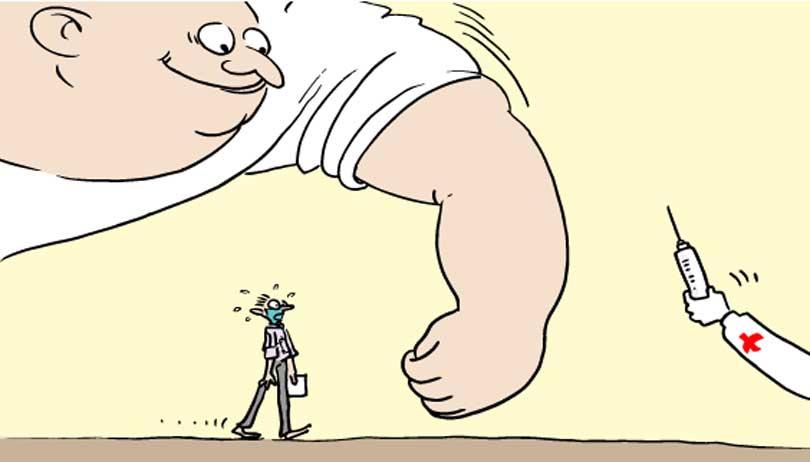Reply To:
Name - Reply Comment

The whole world is banking on the few vaccines produced by major countries to protect its population that stands at over 7.8 billion from COVID-19 pandemic. Around another 200 vaccine producing candidates are awaiting laboratory and clinical tests, some of which are at their last phase of clinical tests. However, there has also been discouraging news that some widely used vaccines have failed in controlling new variants of the new corona virus in countries such as South Africa and some countries have seen hundreds of new variants.
Yet, we are left with the only option of using the vaccines that have been approved by the World Health Organization (WHO) in facing the pandemic threat, with the desperate hope that Sri Lanka would not find any variant that would challenge the capacity of the vaccines we have in hand.
Currently, Sri Lanka has received an Indian consignment of 500,000 COVISHIELD vaccine doses which are now being administered to various groups in the country. China has offered to provide 300,000 shots of its Sinopharm vaccine. The WHO is to provide little over eight million doses for 20% (4.2 million persons) of the country’s population under the global COVID-19 vaccines Global Access (COVAX) facility. State Minister of Primary Health Services, Pandemics and COVID Prevention, Sudarshani Fernandopulle has said that Sri Lanka would purchase 18 million doses of vaccine for nine million people in the country.
Despite the WHO recommends vaccination for COVID-19 for those above 16 years of age, the Sri Lankan authorities have stated that the upper ceiling for the vaccination exemption would be 18 years, a group that constitutes around 25 to 30% of the population or 5 to 6 million people. Therefore it seems that around 2.5 out of 21.5 million people of the country are not accounted for.
Former head of the Epidemiology Unit of the Health Ministry Nihal Abeysinghe had stated during a televised interview that Sri Lanka had submitted a priority list of eligible people for COVID-19 vaccine to the WHO at the request of the world body, before the latter sanctioned its offer of vaccines to the country, and he stated the list was based on the same criteria of the WHO.
The United Nations International Children’s Emergency Fund (UNICEF) points out that the WHO had advised that priority groups should include health and social care workers on the frontlines, people over the age of 65, people under the age of 65 who have underlying health conditions that put them at a higher risk of dying from COVID-19. Dr. Abeysinghe attributes the criteria to the purpose of minimizing deaths.
Chief advisor to the President and head of the newly-appointed presidential task force for Sri Lanka’s COVID-19 vaccination drive LalithWeeratunga told media last month that frontline workers in health, armed forces and other sectors, people over the age of 60 with non-communicable diseases and select individuals between 50 to 59 years of age that are deemed important to the smooth functioning of the economy will be among 20% of Sri Lankans who will receive COVID-19 vaccines under the global COVAX facility.
And the health Ministry in its Guidelines for COVISHIELD Vaccination Campaign during January-February 2021 cites all healthcare staff in the country (government and private), non-health support staff considered as frontline workers directly in contact with COVID -19 patients in Covid control and prevention activities (Defence Services, Police/STF, Civil defence etc.) and selected staff at Ports of entry who directly in contact with possible COVID-19 import cases as target groups.
However, when it came to practice, the priority list seems to have changed. In a seemingly corruptive manner, the politicians have jumped the queue and the authorities have resorted to vaccinate people on the basis of Grama Niladhari divisions as well. Dr. Abeysinghe says that this is against the WHO guidelines and this would sometimes affect the country’s engagements with the World body.
Government ministers have justified the vaccination of members of Parliament claiming that they are closely interacting with ordinary people. What they have ignored is the fact that unlike the MPs, there are groups such as bus crews, school van drivers, drivers of cab service and those who work in eateries, boutiques that are dangerously mingling among people.
The WHO has warned that “world’s poorest and most vulnerable must not be ‘trampled in the stampede’ for COVID-19 vaccines,” pointing out that just ten countries have administered 75% of all vaccinations. Yes, “most vulnerable must not be trampled in the stampede” locally as well.